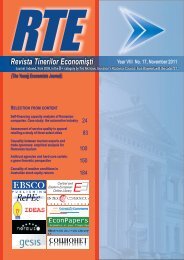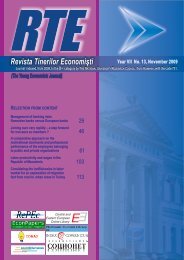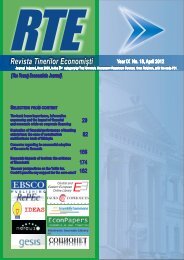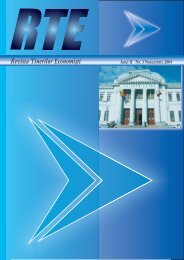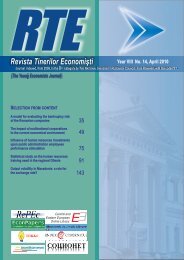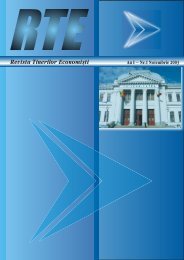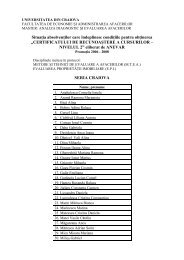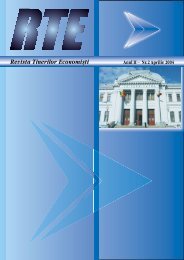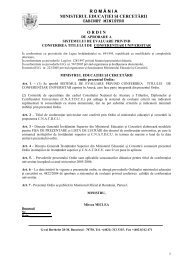Revista Tinerilor Economiºti (The Young Economists Journal)
Revista Tinerilor Economiºti (The Young Economists Journal)
Revista Tinerilor Economiºti (The Young Economists Journal)
Create successful ePaper yourself
Turn your PDF publications into a flip-book with our unique Google optimized e-Paper software.
<strong>Revista</strong> <strong>Tinerilor</strong> Economişti (<strong>The</strong> <strong>Young</strong> <strong>Economists</strong> <strong>Journal</strong>)<br />
<strong>The</strong> Australian economy is also exposed to weather conditions and its<br />
variability. <strong>The</strong> Australian S&P/ASX200 Index includes companies from the major<br />
weather sensitive sectors of the economy such as energy suppliers, transportation<br />
systems and others that are heavily dependent on weather and weather forecasting.<br />
Thus, there is a high possibility that investors do actually incorporate weather-related<br />
information in their decision-making processes.<br />
Thus, on one hand, capital markets could respond to new weather-related<br />
information and incorporate this information in the stock valuation process. On other<br />
hand, stock prices could be affected by the mental or physical state of investors caused<br />
by weather conditions. People are ‘rational’ in standard finance and they are ‘normal’ in<br />
behavioral finance. Rational people have perfect self-control, and they are always<br />
averse to risk and never averse to regret. However, normal people do not always follow<br />
that pattern (Statman, 1999).<br />
<strong>The</strong> Efficient Market Hypothesis is associated with idea of ‘random walk’,<br />
which is used in financial literature to characterise the price series where all subsequent<br />
price changes represent random departures from previous prices. <strong>The</strong> logic of the<br />
random walk is that the information is immediately reflected in stock prices. <strong>The</strong> news<br />
is unpredictable, and thus price changes must be unpredictable and random. <strong>The</strong><br />
importance of the EMH is that it justifies the use of movement in stock prices as the test<br />
of usefulness of financial and non-financial information. However, behavioural finance<br />
points to the existence of market bubbles and manias as examples of cases where<br />
human behavior may be the missing link that explains such market anomalies. This<br />
study suggests that Australian stock market returns are affected by weather; however,<br />
the way in which weather affects stock prices remains the question.<br />
6. CONCLUSION<br />
If modern finance relies on two key assumptions: rational people and a ‘fair<br />
price’ being determined by financial markets, behavioural finance examines the<br />
psychology underlying investors’ decisions to explain irrational behavior. Recent<br />
literature in behavioural finance investigated the effects of weather conditions on the<br />
emotional state of investors. This study investigated the hypothesis that the weather<br />
causes changes in Australian stock market returns. But contrary to previous research,<br />
this study found that the weather effect of humidity causes significant changes in<br />
Australian stock returns.<br />
Australia experiences high humidity throughout the year. High humidity could<br />
significantly affect physical and mental capacity and, consequently, could have an<br />
effect on financial trading activities and investment decision-making processes.<br />
Moreover, humidity is an important metric in weather forecasting. Weather has always<br />
played an important role in the economy and could significantly impact on business<br />
activities. <strong>The</strong> S&P/ASX 200 All Australian Index is a broad market index that includes<br />
Australian domicile companies as well as companies that depend on weather for their<br />
business.<br />
On one hand, the capital market could respond to new weather-related<br />
information and could incorporate this information in the stock valuation process.<br />
Alternatively, stock prices could be affected by the mental or physical changes in<br />
investors, caused by weather conditions. Does weather-related information have an<br />
172



